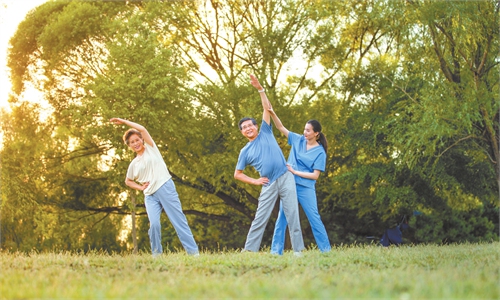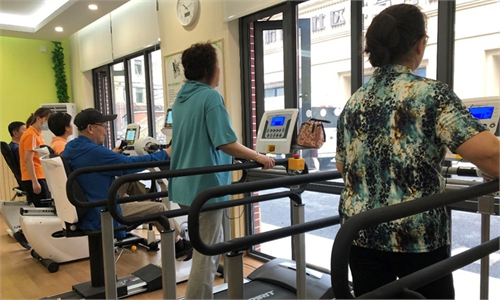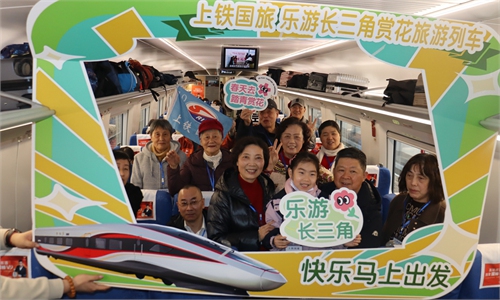IN-DEPTH / IN-DEPTH
More Chinese ‘silver-haired volunteers’ engage in education, medicare voluntary work in lesser-developed areas
Hearts of service
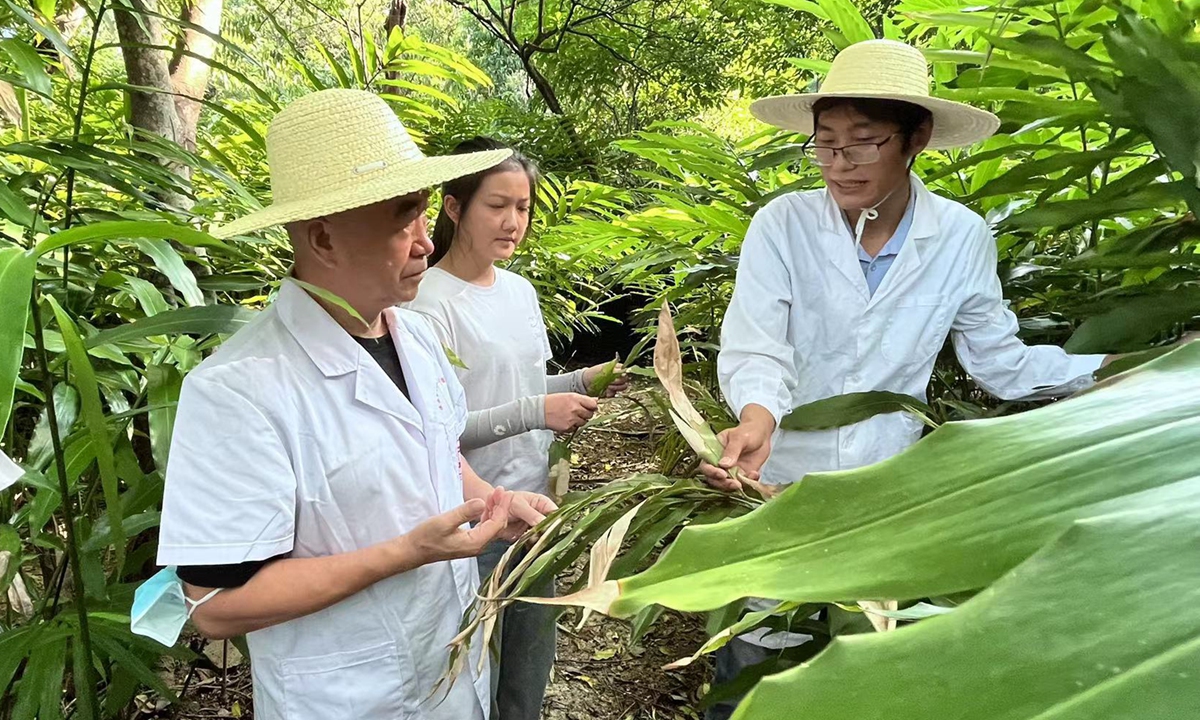
Zhang Yongyu (left) and a young teacher (right) teach a student about herbal medicine in Xishuangbanna Dai Autonomous Prefecture in Southwest China's Yunnan Province. Photo: Courtesy of Zhang Yongyu
Editor's Note:With China's population of seniors over 60 surpassing 300 million, ensuring a happy and fulfilling life for all seniors has become a pressing issue for both families and the nation. How can the new generation of seniors in China break away from traditional norms and embrace a different lifestyle, supported by AI technology, multiculturalism, and an elder-friendly society?
The series "Old Age, New Trends" will explore emerging trends in the silver economy, creative social norms among senior citizens, and innovative eldercare services. It will examine the opportunities and challenges presented by an aging society, highlighting the diverse lifestyles of seniors and the booming eldercare industry in China. Beneath these new trends lies a reflection of Chinese modernization, which aims to provide more secure systems and dignified lives for its senior population.
In 2018, 65-year-old traditional Chinese medicine (TCM) professor Zhang Yongyu flew over 3,000 kilometers from Shanghai to Xishuangbanna Dai Autonomous Prefecture, Southwest China's Yunnan Province, to start a three-year teaching journey.
There the humid climate, the relatively high altitude, the unfamiliar spicy and sour cuisine, and the much smaller apartment compared to his duplex in Shanghai, among other major changes, all led Zhang to initially believe that he would quickly return to Shanghai once his teaching stint in Xishuangbanna was over.
However, seven years later, Zhang is still in Xishuangbanna. "I might not return [to Shanghai] in the near future," he told the Global Times in a phone interview. "There's still so much for me to do here."
Zhang is among a growing number of senior volunteers in China. Encouraged by the government, and the rise of a volunteer service culture in Chinese society in recent years, an increasing number of skilled professionals are finding that retirement doesn't mean idleness. Instead, they have opted to contribute to education, healthcare, and other forms of assistance in China's lesser-developed regions with passion and compassion.
Many of the seniors serve in central and western regions under China's "Silver Age Action" initiative, which was launched to leverage the expertise of senior professionals in various fields to assist in improving lesser-developed areas.
With their expertise and experience, along with a spirit of dedication, these "silver-haired volunteers" are making contributions in remote areas. They find fulfillment and joy in their volunteer work, embodying the positive and active spirit of a new generation of Chinese seniors. The Global Times recently spoke with four silver-haired volunteers in the fields of education and healthcare, who shared vivid personal stories about how they not only help local students and patients, but also contribute to the overall development of the regions they serve.
'To aim higher'
The school where Zhang volunteers as a teacher is West Yunnan University of Applied Sciences (WYUAS), a new institution approved by the Chinese Ministry of Education in 2017 to enhance education in Yunnan.
In 2017, before his official retirement, Zhang flew to this university several times to teach several classes and give one-off lectures. The following year, after retiring from Shanghai University of Traditional Chinese Medicine, Zhang didn't hesitate to sign a three-year voluntary teaching agreement with the WYUAS.
"Although I was retired, I didn't want to rest just yet," Zhang told the Global Times. "I wanted to go where the country needs [me] the most."
At the WYUAS, Zhang teaches courses related to traditional medicine, participates in the construction of the university's medical laboratory, and dedicates a lot of energy to his students' academic success.
Zhang recalled that, at first, many students at the WYUAS were not particularly diligent in their studies and lacked ambitious goals and a sense of self-improvement. To address this, Zhang often engages his students in academic research after class and supports them in their pursuit of graduate studies.
Zhang clearly remembers the number of his students who successfully gain admission to graduate school each year. To his satisfaction, this figure has been rising steadily each year. "I often encourage my students not to be satisfied with the status quo, to have lofty aspirations, and to aim higher," Zhang said.
Those who volunteer to teach in China's lesser-developed central and western regions may often encounter a similar challenge: Many students and their parents there tend to undervalue education, and lack high aspirations for their future. Changing this mindset sometimes requires the heartfelt guidance of those retired teachers, who can inspire and enlighten local people with their life experience.
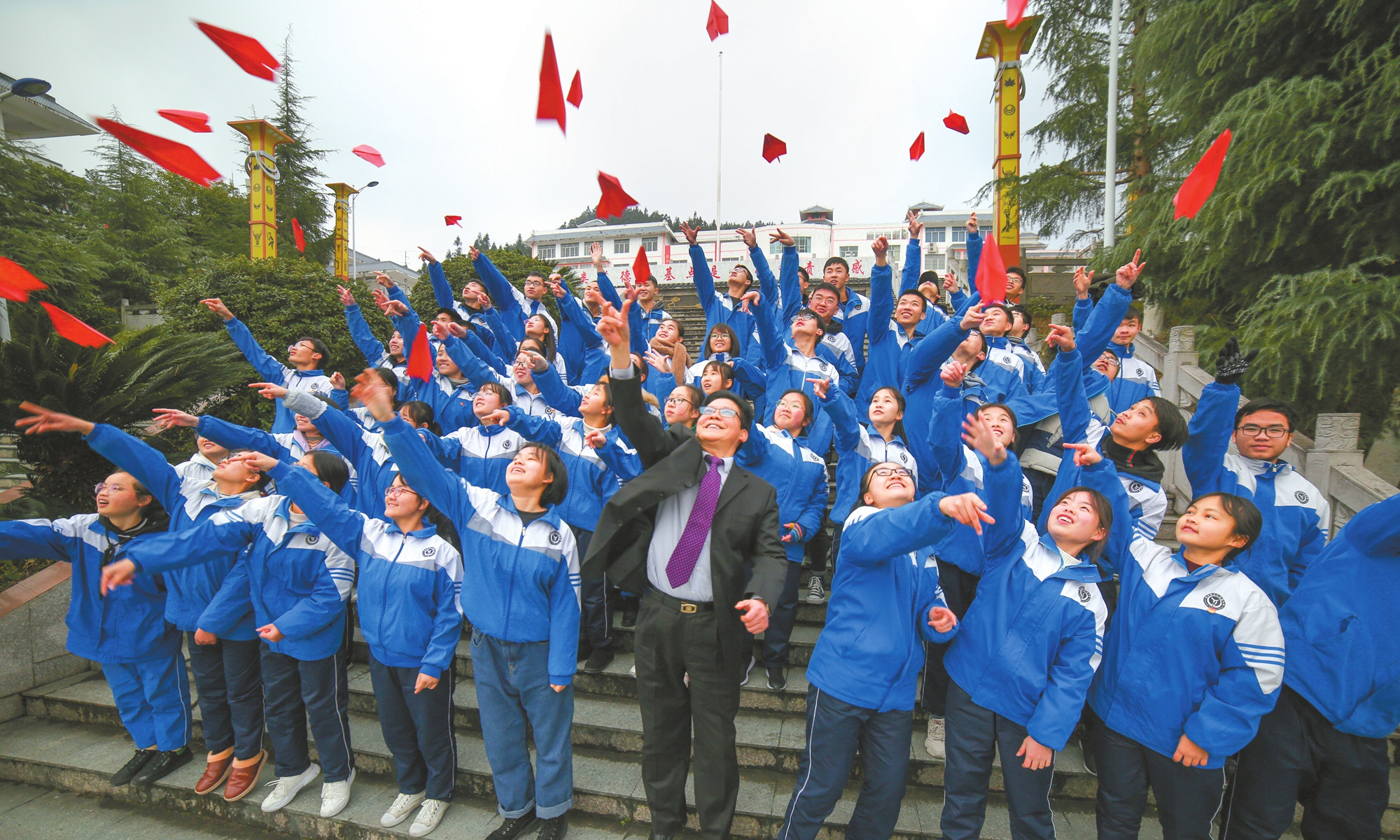
Chen Liqun flies paper planes with students from Taijiang county, Southwest China's Guizhou Province. Photo: Courtesy of Chen Liqun
In 2016, when Chen Liqun stepped down from his role as principal at a secondary school in Hangzhou, East China's Zhejiang Province, to voluntarily take on the position of principal at a secondary school in Taijiang county, Southwest China's Guizhou Province, he faced similar challenges.Chen Liqun recalled that, when he first arrived at the school, he found many teachers and students there exhibited an indifferent attitude toward education. "Once, I came across a 'wish wall' in a classroom, where a boy had written that his goal for his three years of high school was simply, 'To marry a wife and bring her home,'" said Chen Liqun.
Chen Liqun initially signed a one-year agreement with the school after his retirement, but he ended up staying for four years, until he returned to Hangzhou in 2020 due to health reasons. During those four years, he refurbished the student cafeteria and dormitories, and established regulations to bring order to campus life. He visited over 300 students' homes on weekends and holidays, dedicating his time to understanding their challenges. Moreover, over the years, he personally contributed over one million yuan ($138,805) to support local students and teachers.
Those efforts saw results. The school's students saw their college entrance exam scores rise from the bottom of the rankings among the 16 counties in the region, to the very top. Even more gratifying for him was witnessing a great shift in the local mindset toward education. "Since early 2018, there have been no more dropouts from that school," said Chen Liqun.
'Tiring but worthwhile'
Since its launch in 2003, the "Silver Age Action" initiative has witnessed more than 7 million senior volunteers participating in over 4,000 assistance projects as of July 2024, according to the Xinhua News Agency. Carrying the spirit of resilience and hard work, they venture into some of the most remote areas across China to assist the people there with heartfelt dedication, undeterred by the challenging and rudimentary conditions they may encounter.
According to information on "Silver Age Action" teacher recruitment received by the Global Times from a college in Yunnan, teachers who join the initiative should hold the position of professor, or serve as doctoral or master's supervisors. They are required to teach at least 64 class hours per year at the institution and deliver several lectures. The annual salary for teachers involved in the initiative is set at 100,000 yuan before tax, along with benefits such as medical insurance. The school also provides accommodation.
For many seasoned professors and scholars from more developed regions, this compensation package is actually far from appealing. "But no one is coming solely for this salary," said a "Silver Age Action" teacher Chen Xiyao, who is a retired professor from the Shanghai University of Sport. "We just want to do something there with our 'remaining heat.'"
Since 2022, Chen Xiyao has been a volunteer teacher at a school affiliated with the WYUAS in Yunnan's Tengchong, a small city bordering Myanmar. Chen Xiyao recalled that when he first arrived in Tengchong, the local climate was a shock to his healthy system, causing him to usually wake up several times a night. "I felt like my hair turned gray overnight," he joked.
To make matters worse, he found that the foundation for the sports-related academic programs at the newly established university was nearly nonexistent. There was no clear talent cultivation plan, and the school lacked essential teaching and research facilities.
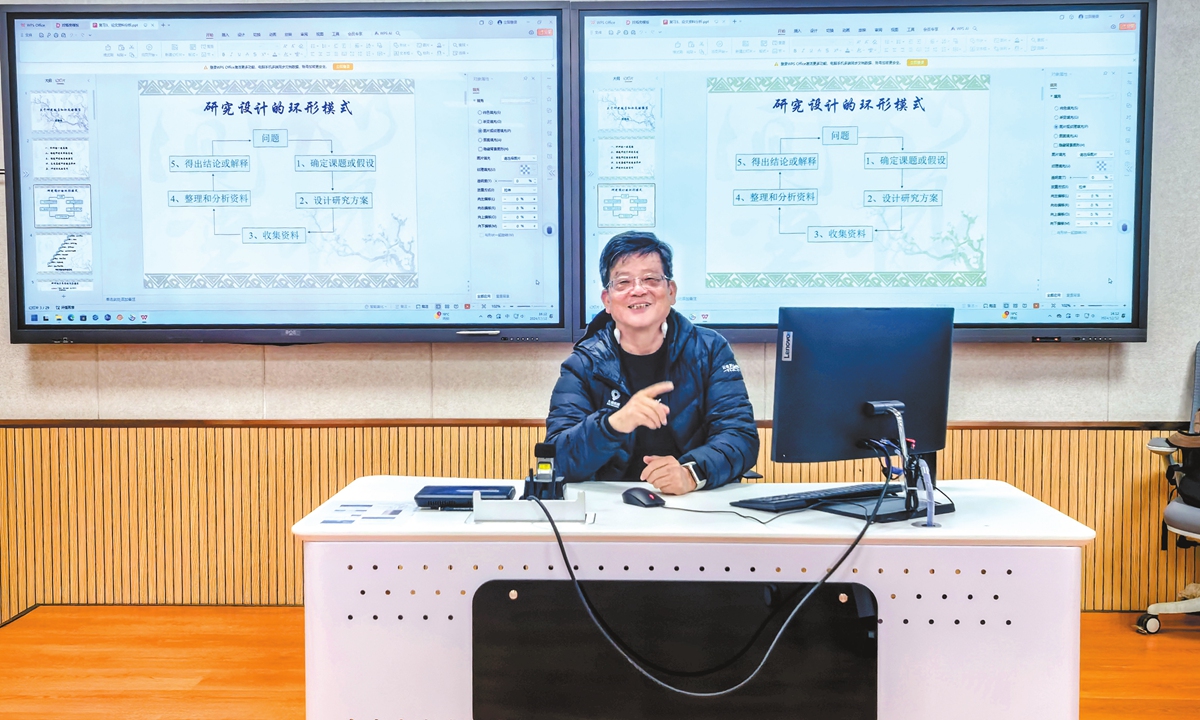
Chen Xiyao teaches a class on thesis writing at the West Yunnan University of Applied Sciences. Photo: Courtesy of Chen Xiyao
Chen Xiyao was determined to bring about changes with his skills and experience. Apart from his regular teaching duties, he spends lots of time and energy in establishing a systematic curriculum for the school's leisure sports program. He guided young teachers in applying for research projects, mentored students on their theses, and assisted them in preparing for graduate school entrance exams.With his assistance, two students have successfully passed the preliminary examination for their doctoral studies this year. If they pass the subsequent stages, "they will become the first batch of PhDs in sports management in Yunnan," Chen Xiyao told the Global Times.
Medicare is another major area in which silver-haired volunteers make contributions alongside education. Wang Jing, a retired anesthesiologist from the Shanghai Eighth People's Hospital, spent several months serving in a town in the Honghe Hani and Yi Autonomous Prefecture of Yunnan.
Wang described his voluntary medical assistance in Yunnan as "tiring but worthwhile." Each day, he would start his shift at a local hospital at 8 am. As his primary workplace was the operating room, the demands of the job often left him with little time even for lunch. Apart from daily responsibilities, Wang would also actively participate in various charitable activities, navigating rugged mountain roads to reach rural hospitals and schools, where he'd provided free medical consultations and teach essential first aid skills.
"Being able to help those in need brings me the greatest happiness." Wang said.
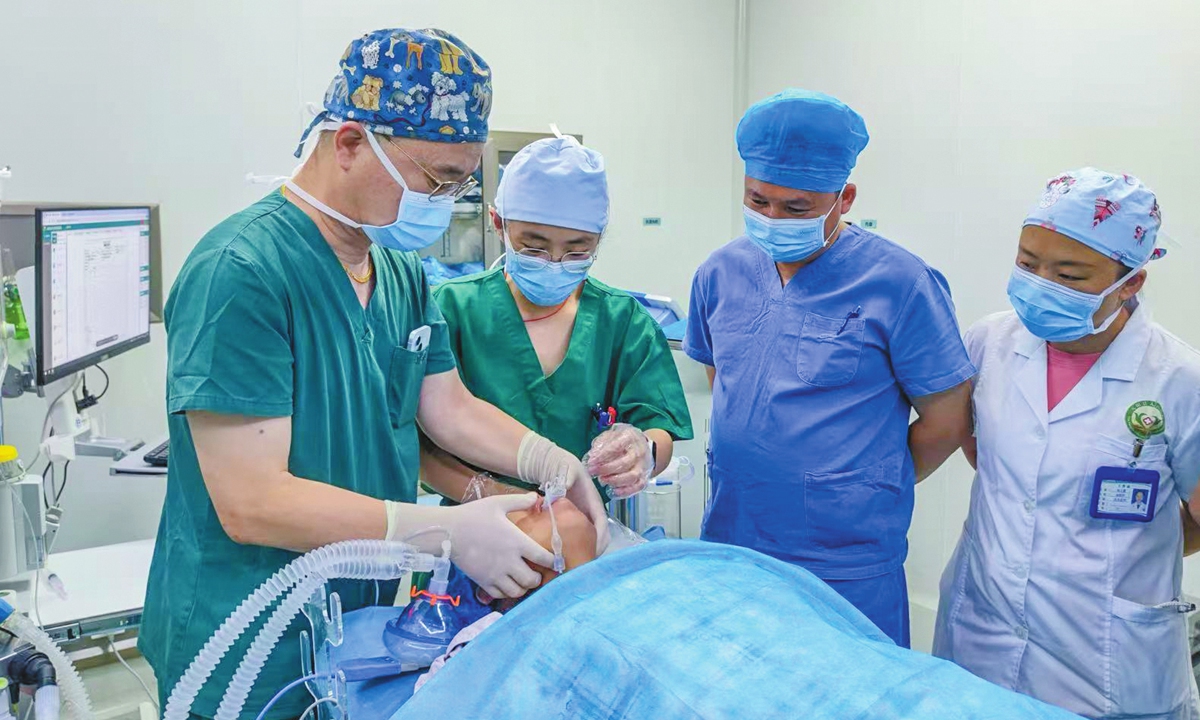
Wang Jing administers anesthesia to a patient during surgery at a hospital in Yunnan Province. Photo: Courtesy of Wang Jing
Make greater contributionThe "Silver Age Action" initiative has flourished under the guidance and support of the Chinese government. According to the Ministry of Civil Affairs' guidelines issued in September 2024, by 2026, this initiative is expected to achieve a higher level of standardization and institutionalization, becoming a long-term volunteer service program for seniors.
An increasing number of senior volunteers are getting involved. In addition to fulfilling their primary volunteer roles, many members of the "Silver Age Action" also make great contributions to the overall development of the regions they serve.
One effective way to foster development in remote areas is to first bring them into the spotlight. Under the efforts of Chen Xiyao and other local silver-haired volunteer teachers, a national-level summit and seminar focused on sports tourism was held in Tengchong in May 2023, drawing much attention to this border city.
In Xishuangbanna, Zhang has signed an agreement with the local government to serve as a consultant for the development of the local traditional medicine industry. Considering the economic conditions there, Zhang said he declined any consulting fees from the government.
After finishing his four-year tenure as a voluntary principal in Guizhou in 2020, Chen Liqun was involved in a national educational support project in 2022. Over the next two years, he visited and conducted research in ordinary high schools in 150 counties across 10 provinces, laying a foundation for the subsequent educational assistance work.
Chen was honored as a "role model of the times" by the Publicity Department of the Communist Party of China Central Committee in 2019. He believes that more silver-haired volunteers like himself can contribute to the development of China's remote areas with their experience and wisdom.
"Silver-haired volunteers have great potential," he told the Global Times. "Remaining spirited and passionate, our 'remaining heat' can still burn brightly."

